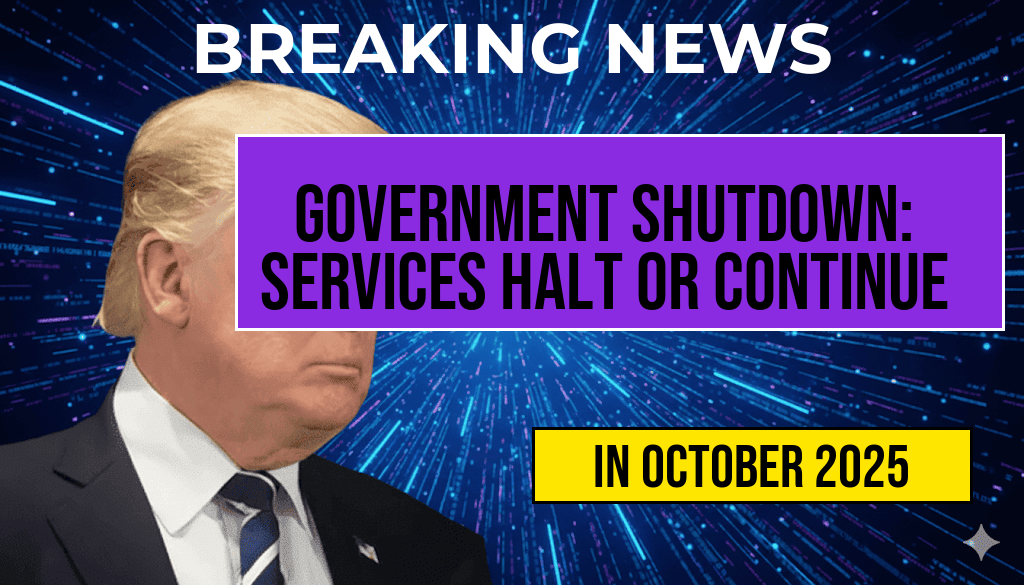The United States government has officially entered a shutdown following the failure of Congress to pass a comprehensive funding package before the midnight deadline. This lapse in federal appropriations affects numerous agencies and services, with some operations continuing under existing authority while others halt entirely. As the shutdown begins, federal employees face furloughs, and essential services are prioritized to maintain national security, public safety, and critical economic functions. This article provides a detailed, agency-by-agency breakdown of which government services will persist and which will cease during the shutdown, including vital programs like Social Security, the Internal Revenue Service (IRS), the Department of Defense, and the Transportation Security Administration (TSA).
Impact Overview: Federal Agencies During the Shutdown
The shutdown results from Congress’s inability to agree on funding levels, leading to a suspension of non-essential government activities. While agencies designated as “essential” continue operations, many others shut down temporarily, affecting millions of Americans relying on federal services. The extent and duration of the shutdown will depend on subsequent legislative negotiations, but initial impacts are already evident across multiple sectors.
Essential Services That Continue
Federal agencies tasked with safeguarding national security, public safety, and critical infrastructure typically maintain operations during a shutdown. These essential agencies are funded through mandatory spending or automatic appropriations, allowing them to keep functioning temporarily.
Department of Defense
- Active-duty military operations continue as usual.
- Overseas military commitments proceed without interruption.
- Military pay and benefits are generally expected to be disbursed on schedule.
- Some civilian defense employees and contractors may face furloughs or work without pay depending on legislative actions.
Transportation Security Administration (TSA)
- TSA staff at airports continue screening passengers to ensure air travel security.
- Most security checkpoint operations remain open, although some non-essential administrative functions may be curtailed.
Social Security Administration
- Benefit payments for retirees, disabled individuals, and survivors are processed as usual.
- Customer service centers may operate with limited hours, but direct deposit and online services remain available.
Other Critical Agencies
- Federal law enforcement and emergency response agencies continue operations.
- Federal courts operate on a limited basis, with essential judicial functions ongoing.
Services That Suspend or Reduce Operations
Numerous federal programs and agencies face significant disruptions during the shutdown, affecting millions of Americans who rely on direct services or federal funding. Most non-essential activities are halted, and many federal employees are furloughed without pay until funding is restored.
Internal Revenue Service (IRS)
- Most tax processing and customer service operations cease.
- Tax refunds and correspondence are delayed.
- Enforcement actions, audits, and taxpayer assistance are suspended.
- Online tools and resources remain accessible, but direct support is limited.
Health and Human Services (HHS)
- Most grant programs, research initiatives, and administrative functions are halted.
- Operations at the Centers for Disease Control and Prevention (CDC) are reduced, affecting disease surveillance and public health initiatives.
- National Institutes of Health (NIH) suspends new research grants, impacting ongoing medical research projects.
Environmental Protection Agency (EPA)
- Fieldwork, inspections, and monitoring programs are suspended.
- Most grant and funding activities are paused.
- Laboratory operations are scaled back or halted.
Other Agencies and Programs
| Agency | Services Continue | Services Halt |
|---|---|---|
| Department of Homeland Security (DHS) | Border security, TSA airport screening, cybersecurity | Immigration processing, visa services, non-essential administrative tasks |
| Department of Education | Federal student aid payments continue for now | New loan processing and administrative functions |
| Small Business Administration (SBA) | Loan processing for existing applications | New loan applications and disaster assistance programs |
Furloughs and Economic Impacts
With many federal employees furloughed, consumer spending and local economies in areas with large government presence could experience immediate downturns. The Treasury Department has indicated that federal employees may face delayed paychecks, although some agencies will prioritize salary payments for essential personnel. The broader economic repercussions depend on the length of the shutdown and the capacity of Congress to reach a funding agreement.
Looking Ahead
Negotiations in Congress continue amid mounting pressure from government officials and affected citizens. Lawmakers face the challenge of balancing fiscal priorities with the need to reopen agencies swiftly. The Biden administration has emphasized the importance of restoring full government operations, citing the disruption to public services and economic stability. For more information on how the shutdown affects specific programs, the [U.S. Government Accountability Office](https://www.gao.gov) offers ongoing updates and guidance.
Frequently Asked Questions
What services will continue during the government shutdown?
During the government shutdown, essential services such as Social Security benefits, TSA airport security, and certain defense operations will continue to operate to ensure public safety and support.
Which federal agencies are most affected by the shutdown?
Most federal agencies, including the IRS, Department of Education, and Environmental Protection Agency, face partial or full shutdown, leading to closures of offices, delays in services, and furloughs for non-essential staff.
Will I still receive my Social Security payments?
Yes, Social Security benefits are considered mandatory spending and will continue to be paid during the shutdown.
How does the shutdown affect the IRS and tax-related services?
The IRS may experience delays in processing tax returns, issuing refunds, and providing customer support. Many tax assistance programs could be temporarily unavailable.
What should travelers expect at airports during the shutdown?
TSA operations will continue, ensuring airport security remains unaffected. However, other federal transportation services and non-essential airport functions might see reduced staffing or limitations.






